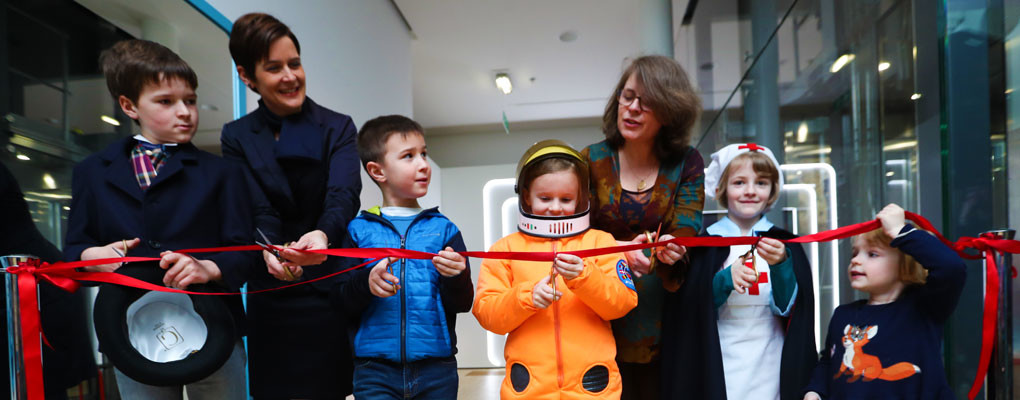
The Family Discovery Spaces were officially opened on Sunday 11 March 2018 by our first young visitors Sophie, Charlotte, Clara and Raffaël. Approximately 800 people attended on the day.
The Spaces are aimed at six to ten year olds and are located on four floors of the museum. They feature specially designed handling objects, low-tech voting stations and interactive games, interconnecting with the collections on display.
The environments and activities allow small groups of family visitors to talk and engage with one another about the objects and ideas they have encountered in the HEH galleries
The spaces are now fully open during the normal museum hours. Facilitated activities such as costume fitting sessions and the role play game in the travel agency take place on Wednesdays between 14:00 - 17:00, and Saturdays, Sundays and Bank Holidays between 10:30 - 11:30 and 14:00 - 17:00.
"Il y a 2 semaines, nous avons testé les espaces famille.
Voulez-vous entendre les questions que les enfants ont posées ?
Attention, ce sera en trois langues: français, néerlandais et anglais.
Is Europa één land?
Est-ce qu’il y aura une guerre bientôt ?
Does everybody use the same money everywhere?
Waar gingen ouders op vakantie toen ze klein waren?
Comment les adultes s’orientaient-ils sans GPS ? Et pourquoi une carte ne bouge pas quand je la touche ?
Why weren’t girls allowed to wear trousers in the past? Because they are so nice to play in!
Au Service éducatif, on adore entendre des questions comme celles-là, surtout dans ce musée.
Pourquoi ?
Parce que toutes les questions sont importantes.
Parce qu’il n’est jamais trop tôt pour poser des questions.
Et parce que des questions comme celles-là, aident les enfants et les adultes à mieux comprendre le monde qui les entoure.
I’d like to take some time now to introduce the concepts of ‘questioning’ and ‘time’ which are both central ideas in our family spaces.
Did you take any time today to listen carefully to the questions of children? And did you take time to answer them?
En franchissant la porte du musée, avez-vous remarqué quelque chose de particulier à propos du temps ?
Les enfants qui visitent les Espaces découverte famille font un voyage dans le passé.
Ils reçoivent un sac à dos avec un chapeau d’explorateur et une montre de voyageur temporel. Ensuite, ils prennent l’éscensceur, qui, dans ce bâtiment est une veritable machine pour voyager dans le temps !
Ils sont initiés à l’histoire européenne de manière à expérimenter, comprendre et s’approprier l’histoire.
I’ll give you a concrete example. A young visitor literally tries on the clothes of a child who worked in a mine hundreds of years ago, digging coal.
After that, it changes the way he sees the world around him today. They may even feel lucky to go to school tomorrow morning!
But more than that, young visitors will have a greater understanding of the ‘adult’ sections in the museum, such as the class struggles during the industrial revolution.
And critically, they will have empathy for children that are still caught up in these issues today in some parts of the world.
I hope this way of learning through discovery will stay with our young visitors through their lives and lead to empathy, curiousity and pursuit of knowledge.
Pour conclure, si nous additionnons les deux concepts dont je viens de vous parler: ‘le questionnement’ et le ‘temps’, qu’obtenons-nous?
Un musée: La Maison de l’histoire européenne
Un musée où nous nous arrêtons, prenons le temps et posons des questions pour chercher des réponses. Et discuter des solutions.
Met plezier rollen wij vandaag de rode loper uit voor kinderen vanuit heel Europa en de wereld.
Vanaf nu is dit museum van hen.
Bedankt voor je tijd. Ik nodig nu onze jonge bezoekers uit om het lint door te knippen.
J’invite maintenant les enfants à venir couper le ruban rouge."




